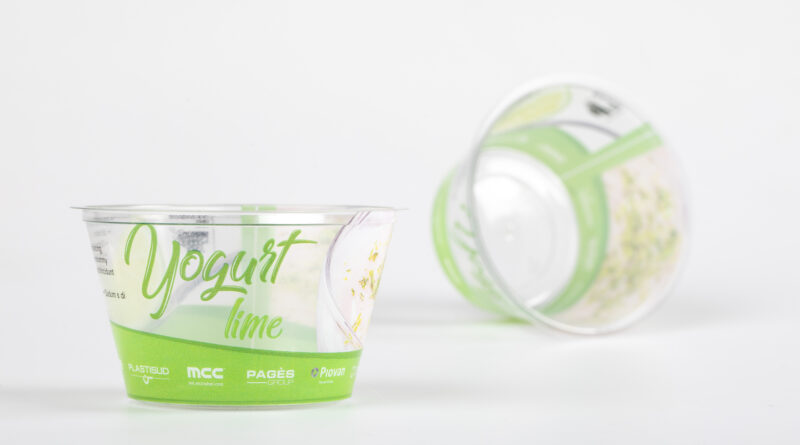ENGEL showcases all-electric PET cup production with 30% rPET content
At K 2025, ENGEL will demonstrate how precision, performance and circular economy principles align in a fully integrated production cell for thin-wall yoghurt cups made of PET. The application, developed for a global brand owner with a strong sustainability focus, uses a blend of 70% virgin PET and 30% food-grade rPET from bottle recycling. The material composition already meets the 2030 targets set by the Packaging and Packaging Waste Regulation (PPWR) and remains fully recyclable.
At the core of the production cell is an all-electric ENGEL e-motion 420 injection moulding machine with 4200 kN clamping force, equipped with a 6+6 stack mould from Plastisud. The system employs injection-compression moulding technology to produce twelve ten-gram cups per cycle in just five seconds. This process allows for reduced injection pressure and material stress, ensuring stable, energy-efficient production of thin-wall PET parts with uniform quality.
The application highlights the technical feasibility of processing rPET in high-performance, all-electric injection moulding. The newly developed 2465 high-performance injection unit achieves speeds up to 500 mm/s—around 67% faster than standard systems—while maintaining consistent melt homogeneity. ENGEL’s iQ weight control plus and iQ motion control digital assistance systems automatically optimise injection parameters and clamping movements in real time, improving efficiency and part consistency.
Partners in the project include Novapet, which supplied virgin PET, NGR, which processed and pelletised the rPET regranulate using liquid-state polycondensation, and Polytainers, based in Toronto, responsible for cup manufacturing. The automation system from PAGÉS handles in-mould labelling, inspection, and packaging, while MCC Verstraete’s NextCycle PET labels can be separated easily during recycling to produce pure, dye-free rPET. The closed-loop recycling concept will also be demonstrated at the NGR stand.
With this exhibit, ENGEL presents an industrial-scale, all-electric PET application that combines material efficiency, reduced energy consumption and readiness for series production—illustrating how advanced moulding technology supports the transition towards a circular plastics economy.
At K 2025, ENGEL will demonstrate how precision, performance and circular economy principles align in a fully integrated production cell for thin-wall yoghurt cups made of PET. The application, developed for a global brand owner with a strong sustainability focus, uses a blend of 70% virgin PET and 30% food-grade rPET from bottle recycling. The material composition already meets the 2030 targets set by the Packaging and Packaging Waste Regulation (PPWR) and remains fully recyclable.
At the core of the production cell is an all-electric ENGEL e-motion 420 injection moulding machine with 4200 kN clamping force, equipped with a 6+6 stack mould from Plastisud. The system employs injection-compression moulding technology to produce twelve ten-gram cups per cycle in just five seconds. This process allows for reduced injection pressure and material stress, ensuring stable, energy-efficient production of thin-wall PET parts with uniform quality.
The application highlights the technical feasibility of processing rPET in high-performance, all-electric injection moulding. The newly developed 2465 high-performance injection unit achieves speeds up to 500 mm/s—around 67% faster than standard systems—while maintaining consistent melt homogeneity. ENGEL’s iQ weight control plus and iQ motion control digital assistance systems automatically optimise injection parameters and clamping movements in real time, improving efficiency and part consistency.
Partners in the project include Novapet, which supplied virgin PET, NGR, which processed and pelletised the rPET regranulate using liquid-state polycondensation, and Polytainers, based in Toronto, responsible for cup manufacturing. The automation system from PAGÉS handles in-mould labelling, inspection, and packaging, while MCC Verstraete’s NextCycle PET labels can be separated easily during recycling to produce pure, dye-free rPET. The closed-loop recycling concept will also be demonstrated at the NGR stand.
With this exhibit, ENGEL presents an industrial-scale, all-electric PET application that combines material efficiency, reduced energy consumption and readiness for series production—illustrating how advanced moulding technology supports the transition towards a circular plastics economy.

